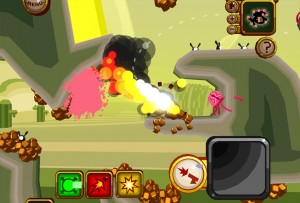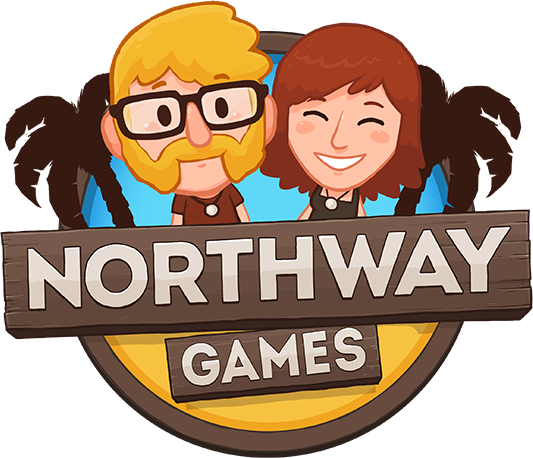
When we were in Honduras last year we had a pretty crappy Internet connection. It was pretty slow and we had to pay for our bandwidth by the meg. When you pay by the meg suddenly podcasts and torrents are less fun. Fortunately there were a few indie games I sucked a lot of fun out of. They kept me entertained for days and all they asked for was a few megs of bandwidth.
One of those games was BrainSplode! by Rich Edwards. BrainSplode! isn’t even a proper game. It’s just a prototype. But it’s so good it drives me crazy that Rich is continuing to prototype stuff rather than just double down on BrainSplode!.
You can think of it as a game about programmable howitzer shells. I like it for a couple of reasons. One is because it is incredibly, rediculously fun. Another is that you can so easily enumerate the complexity of BrainSplode!.
 I will give a very brief description but you should really just go play it. Brain Splode! starts off as a very familiar ballistics game ala Scorched Earth or Crush the Castle. But it mixes in some Roborally/SpaceChem style programmable elements. Namely, you can chose to change the direction of the shell, fire off a booster rocket, pop a parachute, or any combination of these three actions at any time after the shell is fired. You do this by lining up three ‘actions’ to take before you fire the shell and then activate them in turn by pressing the mouse button.
I will give a very brief description but you should really just go play it. Brain Splode! starts off as a very familiar ballistics game ala Scorched Earth or Crush the Castle. But it mixes in some Roborally/SpaceChem style programmable elements. Namely, you can chose to change the direction of the shell, fire off a booster rocket, pop a parachute, or any combination of these three actions at any time after the shell is fired. You do this by lining up three ‘actions’ to take before you fire the shell and then activate them in turn by pressing the mouse button.
As an example, I can fire the shell high and to the left, then I can make it face backwards, then I can fire off a booster rocket which sends it flying to the right and then pop a chute to slowly glide towards my final target.

BrainSplode! has something like 6 variables to play with. Two for the cannon, one for how I program the shell, one for how I set the direction changer (assuming I use one) and then another couple for when I choose to activate each action.
Since a lot of these variables are along a continuum and not discreet choices it’s hard to enumerate the total number of options available but we can easily see that the solution space is huge. In fact I think it’s too big. BrainSplode! is yet another game in a long series of games that I love but utterly fail at convincing my friends to play. I pestered everyone I knew and almost no one else finished BrainSplode!. I think that has to do with the complexity of the solution space.
There is some good empirical evidence that the two variables of the ballistics game on their own represent a comfortable level of complexity (Angry Birds). So I think BrainSplode! is stumbling outside the optimum complexity fun-zone. As an interesting experiment I’d like to try pushing it back into the fun-zone. Here’s how the experiment goes. You can play along at home.
- Download BrainSplode!
- Beat BrainSplode! normally.
- Go back to level 7 and set the cannon to shoot up and left with minimum power (put the power meter in the very top left of the square). Now beat level 7 without moving the cannon.
- Do the same for level 6.
 You have to beat the game first because steps 3 and 4 are very hard (since the game isn’t designed with them in mind) and if you didn’t the difficulty curve would be way out of whack. By holding the cannon variables constant we push BrainSplode! back towards the optimal-fun zone where the complexity is more manageable. I think as players and designers we intuitively understand when something is too complex or not complex enough, but only after the fact. We pretty much have to build something and play it before we know if it needs more or less stuff glued onto it. Worse still after we’ve been living with a game for a while we lose perspective on the optimum complexity: “I have no problem understanding the game I’ve been making for 4 months, I don’t know why other people are having trouble”.
You have to beat the game first because steps 3 and 4 are very hard (since the game isn’t designed with them in mind) and if you didn’t the difficulty curve would be way out of whack. By holding the cannon variables constant we push BrainSplode! back towards the optimal-fun zone where the complexity is more manageable. I think as players and designers we intuitively understand when something is too complex or not complex enough, but only after the fact. We pretty much have to build something and play it before we know if it needs more or less stuff glued onto it. Worse still after we’ve been living with a game for a while we lose perspective on the optimum complexity: “I have no problem understanding the game I’ve been making for 4 months, I don’t know why other people are having trouble”.
I’d love to understand the relationship between complexity and fun better. Mostly I find it an impenetrable fog. I’m always trying though and BrainSplode! is probably the most fun experimental complexity playground I’ve yet to find.
p.s. if you’re really looking for a BrainSplode! challenge I have two more for you:
– Try level 7 but with only one set of programed commands. You can use parachutes and rockets and everything, but you can only set them once at the beginning and never change them. This includes the green change-angle power. You can use it but you must chose one angle at the very beginning and never change it. You also have to leave the cannon locked in one place, but you can set it anywhere you like. No changes to anything! (if you play RoboRally then think of it as having all your registers locked).
– Then try level 6 the same way.
I’m pretty sure I’m the only one in the world to get these ones. Even Rich shied away from these challenges. Happy ‘Sploding!


Comments
4 responses to “How Complex is BrainSplode!?”
Sigh. Aren’t the days of making single platform games dead and gone? I don’t want to have to set up a whole Windows machine just to try out someone’s game.
In Rich’s defence, it is just a prototype. Although quite a well fleshed out prototype.
Your discussion on optimal complexity fun-zone actually touches on an area of education psychology that I was researching during last summer. Players enjoy challenges when they are “pleasantly frustrating.” They are stumped by the challenge but they know they almost had it. In education terms it’s called zone of proximal development, where the most rewarding learning experience takes place. When the challenge becomes too difficult or too easy, players lose interest. Of course, there is no consensus of what is “pleasantly frustrating” as it differs from person to person but some games like Angry Bird, Tetris, or Bejewel manage to hit the sweet spot and have mass appeal.
Here’s the slideshow of my presentation: http://prezi.com/2v4gnkopq02f/game-based-assessment-in-the-classroom/
BTW, I had my classmates play Fantastic Contraption as a part of my presentation to illustrate my point. Ideally I would have them play Wordup Dog too but didn’t have enough time.